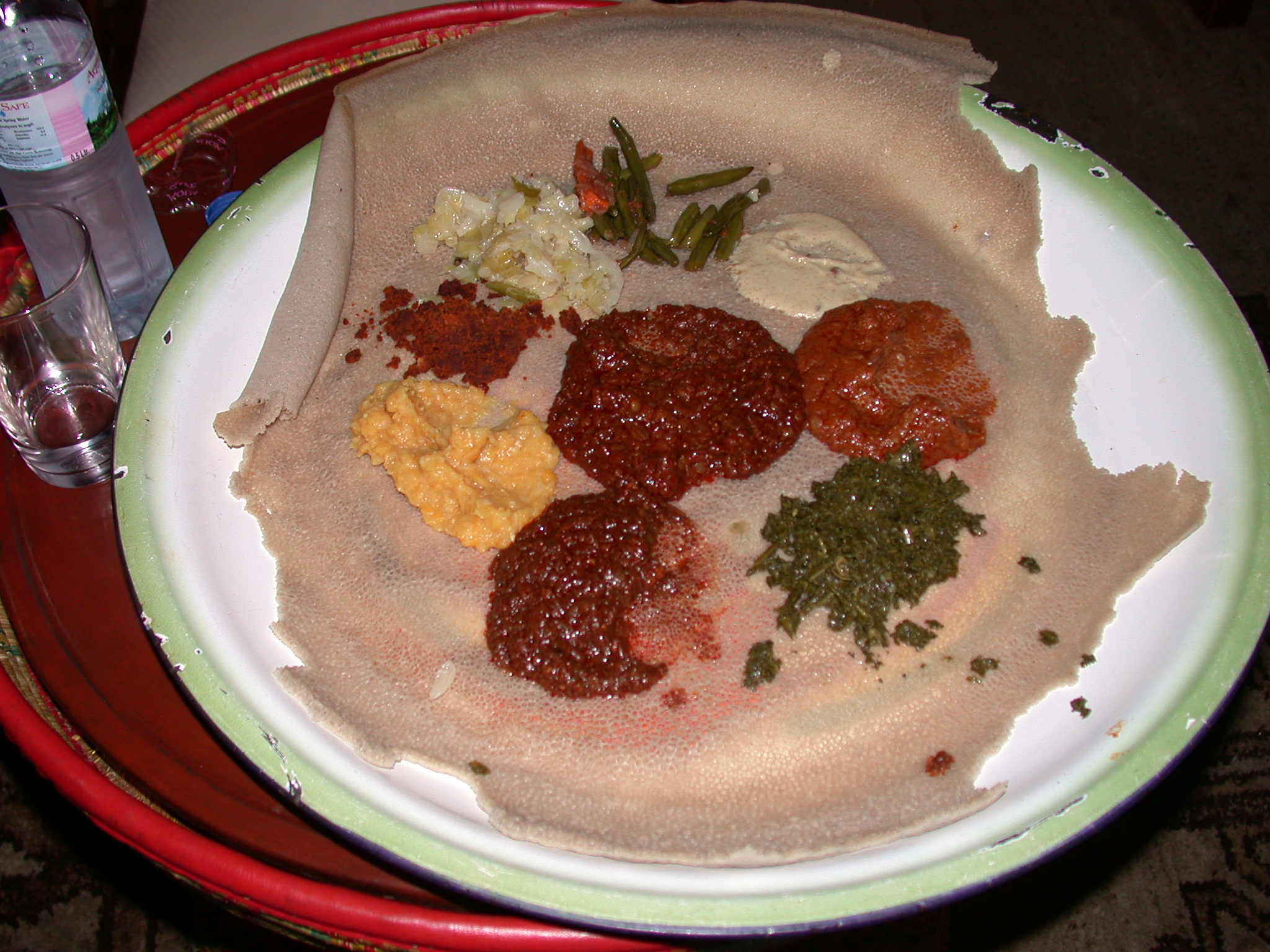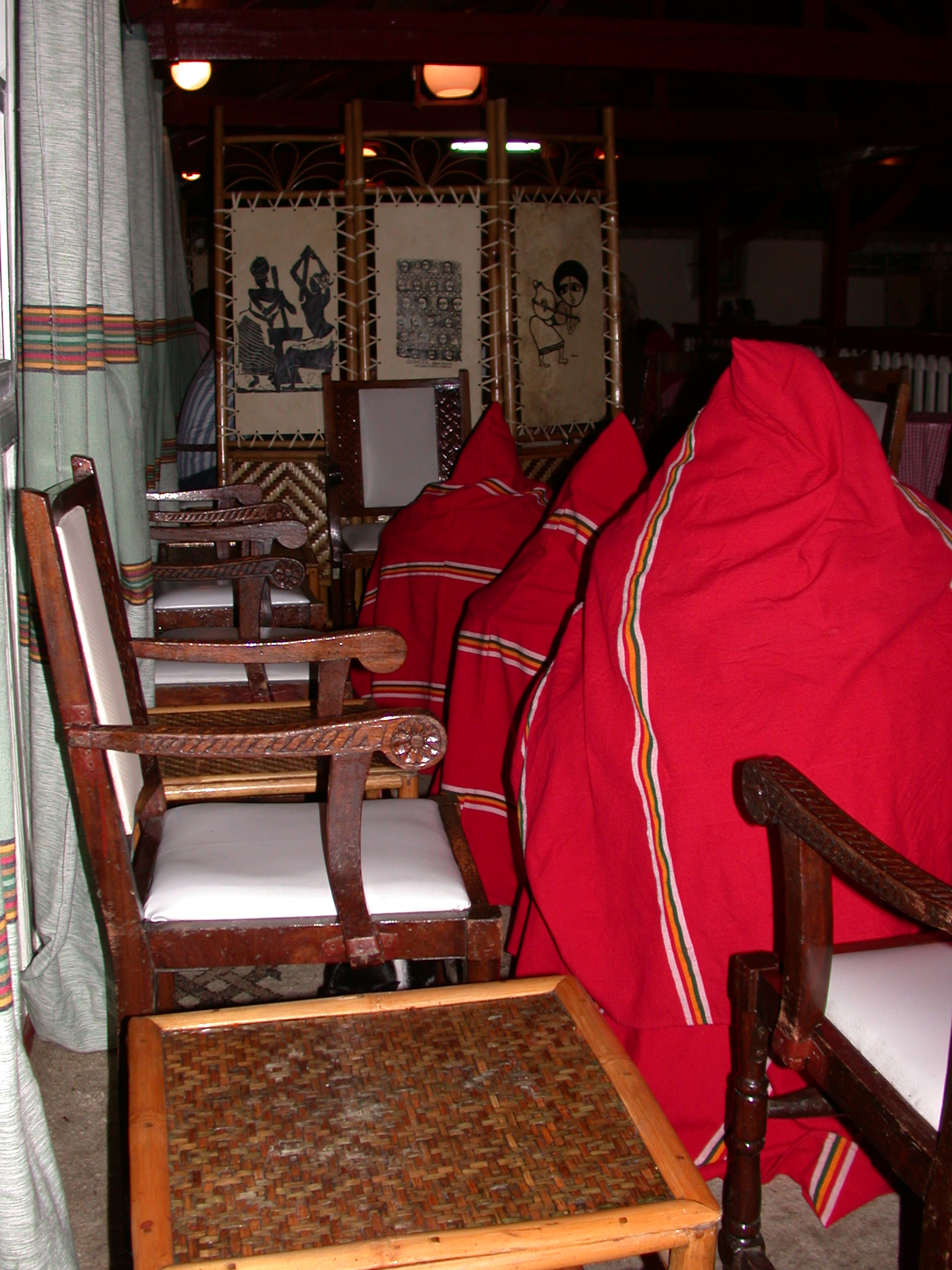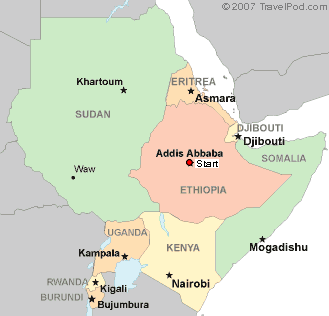Written at Finfine Hotel, Addis Ababa, Ethiopia
After leaving the Internet cafe on Saturday, I walked just around the corner and sat down on a little chair at the end of the chained-off drive in front of the the Ethiopia Hotel. One of a couple of Sudanese runner girls who I saw out in front of the Internet cafe said “hi�?. I responded and we chatted a bit until some other guys came along. They explained that runners from Sudan often go to Ethiopia to train in altitude so they will have higher tolerance.
I Think I’m Turning Ethiopian
I learned that Ethiopians are different from those of us from the U.S. and Europe in another way. That is, their 12:00 starts at our 6:00am and our 6:00pm.
At first, I thought it crazy. But this morning I woke up realizing how much more sense it is for the time system to reflect and reinforce the behavior of starting the day when most people wake up. In the case of urban Ethiopians, the wake-up call comes automatically each morning from the local muzzeins who chant from the minarets. That wake-up call comes at 11:30 Ethiopian (i.e. 5:30am under the U.S./Euro time system). Then, they chant again 12:00 or 6:00am to wake most people up, to pray or perhaps at least to get ready for work. The next time 12:00 rolls around, it’s basically time to kick off work and eat some dinner.
Contrast the Ethiopian method with our method based on the astronomical notion of the maximum darkness or distance from the earth and the maximum lightness or minimum difference from the sun. We’re constantly messing around with daylight savings time schemes to make the time system more practical and energy-conserving. Which system is more practical really?
So, another weird thing about Ethiopia is that they never switched to the new Gregorian calendar which we currently use. So, most Ethiopians are getting ready to celebrate the new millennium of the year 2000 still. They are about seven years behind us, and their months only partially align to ours.
Moving to the Finefine Hotel
I tramped over to the Hotel Finfine to see if they had rooms available. The reception lady shows me the only room available. This hotel is still a bit old and perhaps drab, but the rooms are gigantic and the bathrooms offer hot water from local thermal springs. The open courtyard reminds me of some fairly well-off Indian hotel. The guard half-heartedly waves his security wand over whatever I happen to be carrying with me when I walk in. Of course, the wand detects problems (i.e. metal I’m carrying with me), which the guard promptly ignores, exchanging a smile with me. I make a reservation for the following day, Sunday.


I had my first meal of Ethiopian food in Ethiopia at the Finfine Hotel. I like the food – various heated and delicious vegetable dishes on the traditional injeera bread. The portions of food are so much food I can’t eat it all for under US$4 dollars.
Cruising the Piazza for Cockroaches
To liven up my evening after returning to the Ethiopia Hotel for my last night there, I decide to check out the Piazza neighborhood of Addis Ababa. On my way to check out the National Theater and the Mega Theater on the way to the Piazza, one of the guys in Andinet Square starts his hustle. “Where are you from?�? “You want to see this or that?�? etc. This one keeps walking with me up Churchill Ave. asking again and again if I want to meet this person who speaks French. Luckily, he clarifies that he wants no money, although I still don’t feel I can trust him.
When I see Satan Bet (Satan’s Theater) closed on the way, I stop to ask a fellow who is leaning against a rail in front of the theater what is going on. He explains that the theater doesn’t show anything in the evening. We admire the beautifully sculpted doors, including a instrument called a kerar in relief on one door. We introduce ourselves. His name is Paulo. After chatting a bit, I let him know I’m heading toward the Piazza.
He accompanies me and I feel perfectly comfortable with him. We stop by the Baro Hotel to see if they have rooms available, but they don’t. We meet a couple of Brits driving their vehicle throughout Africa… they started in West Africa and seven months later are now on an itinerary similar to mine through Ethiopia, Sudan, and Egypt.
Paulos and I look around the Piazza area for a place to buy a draught beer. The first place we enter has run out of draught. Paulo brings me to another one where we climb the rickety spiral stairs. The DJ is playing other music upstairs, mostly from the U.S. After I comment on how I’d like to hear Ethiopian music, Paulos asks the DJ and he plays some famous Ethiopian music. Paulos tells me the most popular singer is Ethiopia is Laun (?) Desessa (?). I’ve heard a bunch of Ethiopian music I really like since I’ve been here, although I’ve had trouble idenitying which is which.
Paulos orders “two draughts�? in Amharic as we had agreed. The waiter brings back two drafts each, double what we could possibly need. Near the bottom of my second draught, I found something really gross: a cockroach. I felt something in my mouth and spit it out. Luckily, it was dead. I couldn’t get the gross feeling out of my gullet for a couple of hours after we left that place. Plus, I couldn’t help suspecting the wait staff of planting the roach in there purposely. Perhaps the cockroach in Ethiopia is similar to the larva in certain special Mexican tequilas? 😉
Ethiopian Religious Acceptance and the Star Trek Connection
I awoke in the morning to the calls from the minarets. It happens five times a day to call the faithful Muslims to prayer. For a country that is so Christian, it is amazing how well the Christians and Muslims get along. I saw Christian construction workers chatting and milling around casually while the Muslim workers got down on their mats to pray.
Star Trek fans will be delighted to learn the origin of the use of the words ferengi, negus, and perhaps also krar, which mean “foreigner,�? “king�? (archaic), and a kind of stringed instrument. in Amharic. I used to think ferengi came from the Hindi word for foreigner, but Hindi doesn’t have negus or krar as far as I know. Amharic is Ethiopia’s official language. Of course, there are dozens of other languages spoken regionally in Ethiopia.

